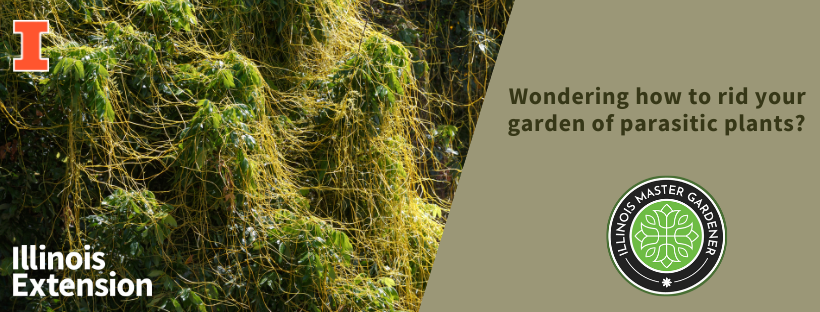Written by Edgar County Master Gardener Jan Phipps
Although not very common, some parasitic plants attack other plants, stealing nutrients from the host to survive. The best-known example is mistletoe which I’ve written about before. The Garden Professors™ listed a few more in an article entitled When Plants Attack! (each other).
Indian pipe (Monotropa uniflora) emerges from the forest floor completely white and lacking in chlorophyll, without which it cannot make its food. It attaches to a nearby tree, usually beech, to get nutrients needed to grow. Beech drop (Epifagus americana) survives the same way.
Squaw root or bear corn (Conopholis americana) connects to the roots of oak trees. It got its name because it looks like an ear of corn emerging from the forest floor.
The previous plants may affect the vigor of their hosts but do not kill them. Dodder (Cuscuta sp.) is a plant that can severely infect and potentially kill any plant it touches. While more common in the southern United States, there are cold hardy varieties that you might run across.
Dodder grows in long strings, lacking leaves or having very obscure ones. It has been described as resembling “silly string”. Yellow-orange is the most common color which fortunately makes it easy to see against a green plant.
It attaches itself to the leaves or stems of a host using a structure called a haustorium, which inserts itself into the vascular system removing water, sugars, and nutrients as needed to survive. After attachment, dodder disconnects from the ground relying completely on the host. It continues to surround the plant, sending out additional haustoria. Dodder will also grow outward searching for new plants. Eventually, the host is either strangled or starved to death.
Dodder is hard to see as it germinates and emerges from the ground, so you probably won’t find it until it is attached and growing on a host plant. It cannot penetrate woody plants, so look for it on herbaceous plants. Once discovered there are no options in killing it without also killing the host. Unlike vining weeds like bindweed or morning glory that can be unwound, dodder is firmly attached by the haustoria. Glyphosate will kill both the dodder and the host, or you can remove both parasite and host from the garden.
Nature can be a dangerous place. Fortunately for us, these parasitic plants attack each other and not the gardener.
The Illinois Extension Master Gardeners of Edgar County are happy to answer your horticulture questions. Call us at 217-465-8585.
